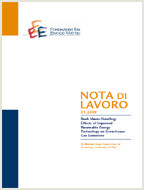The Survival of the Conformist: Social Pressure and Renewable Resource Management

Date
29.09.2010
29.09.2010
Authors
Alessandro Tavoni, Maja Schlüter, Simon Levin
JEL Code
C73, Q20, D70
C73, Q20, D70
Keywords:
Cooperation, Social Norm, Ostracism, Common Pool Resource, Evolutionary Game Theory, Replicator Equation, Agent-based Simulation, Coupled Socio-resource Dynamics
Cooperation, Social Norm, Ostracism, Common Pool Resource, Evolutionary Game Theory, Replicator Equation, Agent-based Simulation, Coupled Socio-resource Dynamics
Publisher
Climate Change and Sustainable Development
Climate Change and Sustainable Development
Editor
Carlo Carraro
Carlo Carraro
This paper examines the role of pro-social behavior as a mechanism for the establishment and maintenance of cooperation in resource use under variable social and environmental conditions. By coupling resource stock dynamics with social dynamics concerning compliance to a social norm prescribing non-excessive resource extraction in a common pool resource (CPR), we show that when reputational considerations matter and a sufficient level of social stigma affects the violators of a norm, sustainable outcomes are achieved. We find large parameter regions where norm-observing and norm-violating types coexist, and analyze to what extent such coexistence depends on the environment.
